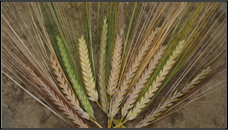Andreas Graner
Unlocking the potential of genetic resources: a genomics perspective
Leibniz Institute for Plant Genetics and Crop Plant Research (IPK) Gatersleben, 06466 Gatersleben, Germany
Essentially, conventional crop plant breeding rests on repeated cycles of crossing and selection. This approach has warranted the development of superior cultivars over the past decades. However, this approach is only sustainable, if the genetic diversity that is lost in the process of selection is adequately replenished by introducing novel diversity into the genepool.Ex-situ conservation of plant genetic resources represents the major backbone to maintain the intraspecific diversity of many important crop plant species. Today, nearly 7 million seed samples are stored in more than 1000 ex situ collections worldwide. Arguably, plant genetic resources (PGR) are required to develop improved cultivars that meet the manifold challenges agricultural production will be exposed to in the future. However, the vast diversity resting on the shelves of genebanks has been tapped into only marginally. Future challenges regarding the utilization of PGR are seen in two areas: (i) improvement in phenotypic analysis and (ii) the generation and deployment of genetic information. As to phenotypic analysis, systematic screens of genebank collections so far remained restricted to few traits only, such as major resistance genes, that show high heritabilities and can easily be scored. The availability of new sensing and imaging technologies is expected to give access to large scale analysis of quantitative traits or components thereof. Regarding the second field, the application of molecular genetic approaches opens many entry points for an improved utilization of PGR. The availability of an ever increasing amount of sequence information has greatly spurred the development of a comprehensive set of SNP markers. These now allow for high density fingerprinting of large number of individuals and the genetic analysis of quantitative traits by performing genome wide association scans. Moreover, the systematic exploitation of intergenomic information will accelerate the isolation of traits by map based cloning, even in complex genomes such as that of barley. Knowledge of the genes that underlie agronomic traits will help unveiling their allelic diversity by systematically mining genebank collections for novel alleles. Notwithstanding the obstacles of a highly complex genome, the ultimate goal to fully exploit the potential of molecular breeding will be the generation of a high quality genomic sequence of barley which is presently underway using next generation sequencing strategies.

